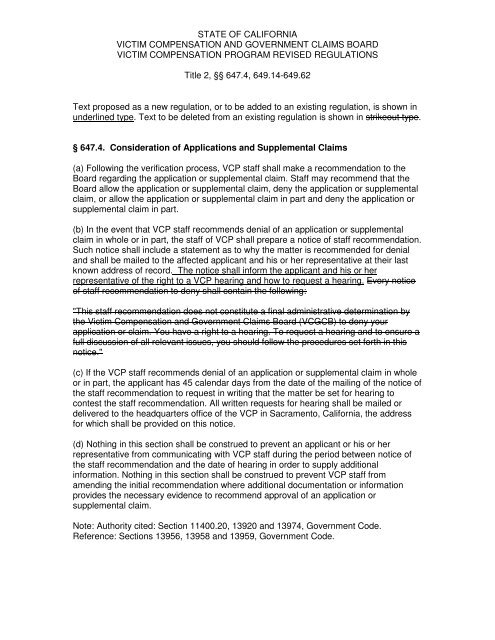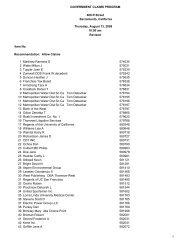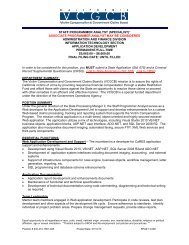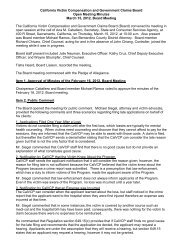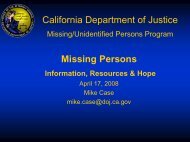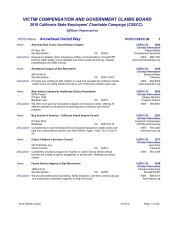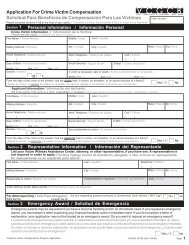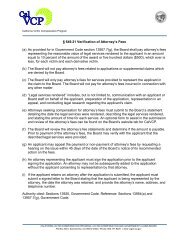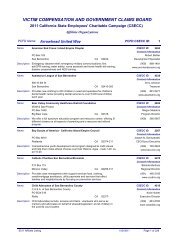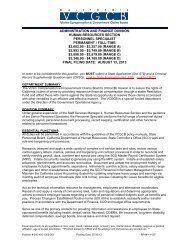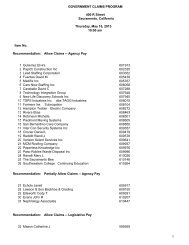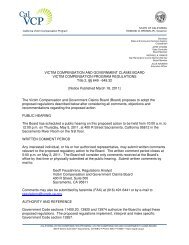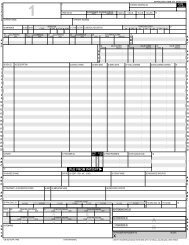STATE OF CALIFORNIA VICTIM COMPENSATION AND ...
STATE OF CALIFORNIA VICTIM COMPENSATION AND ...
STATE OF CALIFORNIA VICTIM COMPENSATION AND ...
Create successful ePaper yourself
Turn your PDF publications into a flip-book with our unique Google optimized e-Paper software.
<strong>STATE</strong> <strong>OF</strong> <strong>CALIFORNIA</strong><br />
<strong>VICTIM</strong> <strong>COMPENSATION</strong> <strong>AND</strong> GOVERNMENT CLAIMS BOARD<br />
<strong>VICTIM</strong> <strong>COMPENSATION</strong> PROGRAM REVISED REGULATIONS<br />
Title 2, §§ 647.4, 649.14-649.62<br />
Text proposed as a new regulation, or to be added to an existing regulation, is shown in<br />
underlined type. Text to be deleted from an existing regulation is shown in strikeout type.<br />
§ 647.4. Consideration of Applications and Supplemental Claims<br />
(a) Following the verification process, VCP staff shall make a recommendation to the<br />
Board regarding the application or supplemental claim. Staff may recommend that the<br />
Board allow the application or supplemental claim, deny the application or supplemental<br />
claim, or allow the application or supplemental claim in part and deny the application or<br />
supplemental claim in part.<br />
(b) In the event that VCP staff recommends denial of an application or supplemental<br />
claim in whole or in part, the staff of VCP shall prepare a notice of staff recommendation.<br />
Such notice shall include a statement as to why the matter is recommended for denial<br />
and shall be mailed to the affected applicant and his or her representative at their last<br />
known address of record. The notice shall inform the applicant and his or her<br />
representative of the right to a VCP hearing and how to request a hearing. Every notice<br />
of staff recommendation to deny shall contain the following:<br />
"This staff recommendation does not constitute a final administrative determination by<br />
the Victim Compensation and Government Claims Board (VCGCB) to deny your<br />
application or claim. You have a right to a hearing. To request a hearing and to ensure a<br />
full discussion of all relevant issues, you should follow the procedures set forth in this<br />
notice."<br />
(c) If the VCP staff recommends denial of an application or supplemental claim in whole<br />
or in part, the applicant has 45 calendar days from the date of the mailing of the notice of<br />
the staff recommendation to request in writing that the matter be set for hearing to<br />
contest the staff recommendation. All written requests for hearing shall be mailed or<br />
delivered to the headquarters office of the VCP in Sacramento, California, the address<br />
for which shall be provided on this notice.<br />
(d) Nothing in this section shall be construed to prevent an applicant or his or her<br />
representative from communicating with VCP staff during the period between notice of<br />
the staff recommendation and the date of hearing in order to supply additional<br />
information. Nothing in this section shall be construed to prevent VCP staff from<br />
amending the initial recommendation where additional documentation or information<br />
provides the necessary evidence to recommend approval of an application or<br />
supplemental claim.<br />
Note: Authority cited: Section 11400.20, 13920 and 13974, Government Code.<br />
Reference: Sections 13956, 13958 and 13959, Government Code.
§ 649.14. Minor Witnesses<br />
(a) A minor witness is a person under the age of 18 who suffers an emotional injury as a<br />
direct result of seeing or hearing a violent crime, and was in close physical proximity to<br />
the victim when he or she witnessed the crime.<br />
(b) A minor witness does not include the following:<br />
(1) A minor who knowingly and willingly participated in the commission of the crime that<br />
is the basis for the minor's application pursuant to section 13957(a)(2)(B)(iii);<br />
(2) A minor who failed to cooperate reasonably with a law enforcement agency in the<br />
apprehension and conviction of a criminal committing the crime. However, in determining<br />
whether cooperation has been reasonable, the Board shall consider the witness' age,<br />
physical condition, and psychological state, cultural or linguistic barriers, any compelling<br />
health and safety concerns, including, but not limited to, a reasonable fear of retaliation<br />
or harm that would jeopardize the well-being of the witness or the witness' family, and<br />
giving due consideration to the degree of cooperation of which the witness is capable in<br />
light of the presence of any of these factors;<br />
(3) A minor involved in the events leading to the crime. The Board shall consider the<br />
witness' age, physical condition, and psychological state, as well as any compelling<br />
health and safety concerns, in determining whether the witness' application should be<br />
denied; or<br />
(4) A direct or derivative victim of the violent crime.<br />
(c) For purposes of Government Code section 13957(a)(2)(B)(iii), a violent crime shall be<br />
found to have been committed in the following crimes:<br />
(1) Murder and manslaughter (including vehicular manslaughter);<br />
(2) Mayhem;<br />
(3) Kidnapping;<br />
(4) Carjacking;<br />
(5) Assault with a deadly weapon;<br />
(6) Battery resulting in great bodily injury;<br />
(7) Rape and rape of spouse;<br />
(8) Sodomy;<br />
(9) Lewd and lascivious acts;<br />
(10) Oral copulation;<br />
(11) Robbery;<br />
2
(12) Arson of inhabited dwelling; or<br />
(13) Burglary of inhabited dwelling with physical injury to an inhabitant.<br />
(d) The eligibility of a minor witness shall not be affected by the eligibility of the victim(s)<br />
or derivative victim(s).<br />
Note: Authority cited: Sections 13920 and 13974, Government Code. Reference:<br />
Sections 13956 and 13957(a)(2)(B)(iii), Government Code.<br />
§ 649.15. Good Cause for Filing Late Applications<br />
(a) A petition for relief from the period of limitations on grounds of good cause must be<br />
filed with the Board in writing not more than 30 days following the date notice is mailed<br />
to the applicant and his or her representative of the late filing, and shall include the<br />
statement under penalty of perjury as specified in subsection (b). An applicant failing to<br />
petition for relief in writing within the 30 days set forth herein will have his or her<br />
application deniedrecommended for denial and shall be deemed to have waived any<br />
right to relief from the period of limitations.<br />
(b) In determining whether good cause exists justifying the late filing of an application,<br />
the VCP staff must consider the following factors, including but not limited to:<br />
(1) A preponderance of the evidence supports that a qualifying crime occurred;<br />
(2) Circumstances of the qualifying crime;<br />
(3) Age;<br />
(4) Documented physical or mental disability to such an extent during the time specified<br />
for filing an application that the applicant could not have effectively pursued a claim and<br />
the victim did not have a conservator;<br />
(5) Cultural or linguistic barriers; and<br />
(6) When the applicant discovers that he or she has incurred a pecuniary loss as a direct<br />
result of the crime.<br />
An applicant seeking relief from the period of limitations on the filing of an application<br />
maymust, with his or her petition for relief and accompanying statement, includesubmit<br />
any corroborating documents which serve to verify the stated justifications for late filing.<br />
(c) If VCP staff does not find good cause for the late filing and recommends that the<br />
application be denied, the applicant may request a hearing to determine the existence or<br />
nonexistence of good cause.<br />
(d) In all cases the determination by the Board as to the existence or nonexistence of<br />
good cause constitutes the final administrative determination on the issue, subject only<br />
to a proper motion for reconsideration upon a showing of new and additional evidence<br />
not reasonably available at the time of the initial hearing. Nothing in this section shall be<br />
3
construed to prevent an applicant or his or her representative from filing the above<br />
stated declaration and petition for relief upon a showing of good cause simultaneously<br />
with the late application.<br />
(e) An application shall be determined to be timely filed if it is filed within 90 days of a<br />
victim incurring a reimbursable loss and no earlier reimbursable loss had previously<br />
been incurred.<br />
Note: Authority cited: Sections 13920 and 13974, Government Code. Reference:<br />
Sections 13953 and 13954, Government Code.<br />
§ 649.16. Applications by Derivative Victims<br />
(a) The period of limitations for filing an application is tolled for derivative victims when<br />
an application by a victim or on behalf of a victim for the same qualifying crime is<br />
accepted by the VCP.<br />
(b) A person shall not be eligible as both a victim and a derivative victim for the same<br />
qualifying crime except with respect to income and/or support loss.<br />
(c b) An person applicant shall only be eligible once as a derivative victim of a crime<br />
regardless of the number of direct victims for that same crime.<br />
Note: Authority cited: Sections 13920 and 13974, Government Code. Reference:<br />
Sections 13951, 13952 and 13953, Government Code.<br />
§ 649.17. Relocation Benefits<br />
(a) All cash payments or reimbursement for expenses incurred in relocating must be<br />
necessary as a direct result of the crime. The amount of reimbursement paid by the<br />
Board shall not exceed the statutory maximum, less the amount of reimbursement<br />
available from other sources.<br />
(b) Determinations by law enforcement or mental health providers may be provided in a<br />
manner determined by the Board, which may include, but are not limited to, in writing, by<br />
telephone, or other electronic means.<br />
(c) One claimant per crime giving rise to the relocation means that only one member of a<br />
household may receive relocation benefits even if more than one member of a houshold<br />
household is a direct victim of the qualifying crime.<br />
(d) A higher level of scrutiny will apply to reimbursement requests if a significant amount<br />
of time has elapsed between the qualifying crime and the date of the relocation.<br />
(e) Relocation expenses may include but are not limited to housing deposits, utility<br />
deposits, telephone deposits, connection fees, temporary lodging costs, emergency food<br />
expenses, emergency clothing costs, emergency costs of personal items, and other<br />
necessary expenses.<br />
4
Note: Authority cited: Sections 13920 and 13974, Government Code. Reference: Section<br />
13957, Government Code.<br />
§ 649.17.1. Increased Relocation Benefits for Unusual, Dire, or Exceptional<br />
Circumstances<br />
(a) A claim that meets the established criteria for relocation benefits may be eligible for<br />
relocation reimbursement of an amount greater than $2,000 due to unusual, dire, or<br />
exceptional circumstances including, but not limited to, the following:<br />
(1) There is a crime report or other verification from law enforcement supporting that the<br />
applicant is an ongoing victim of threats or retaliation by or on behalf of the offender with<br />
a credible threat of great bodily injury or death and the claim meets the following two<br />
criteria:<br />
or<br />
(A) The applicant did not inform the offender of the location of the applicant’s new<br />
residence or had obtained a restraining order against the offender and the<br />
offender has located the applicant; and<br />
(B) The applicant’s new residence must be located at a distance of no less than<br />
30 miles from the residence at the time the crime occurred.<br />
(2) If a mental health treatment provider has verified that the relocation was necessary<br />
for the emotional well-being of the applicant, then at least one of the following factors<br />
must be present:<br />
(A) The qualifying crime resulted in substantial impairment of the applicant’s<br />
activities of daily living;<br />
(B) The qualifying crime resulted in permanent and substantial disability of the<br />
applicant; or<br />
(C) The applicant is scheduled to testify or has testified as a witness in any<br />
criminal proceeding related to the qualifying crime and the need to relocate is<br />
directly related to the applicant testifying.<br />
(b) The following circumstances will not qualify a victim for the unusual, dire, or<br />
exceptional circumstance relocation benefit on their own merit:<br />
(1) Moving to or within a higher cost area<br />
(2) Having a large family<br />
(3) Moving a long distance<br />
Note: Authority cited: Sections 13920 and 13974, Government Code. Reference: Section<br />
13957, Government Code.<br />
5
§ 649.19. Home Security Device or System<br />
(a) The VCP will reimburse the costs of a new or additional home security device or<br />
system. Examples of home security device or system items include, but are not limited<br />
to the following:<br />
(1) Alarms, keypads, cameras, and motion detectors.<br />
(2) Installation costs;<br />
(3) Monitoring costs;<br />
(4) Window bars and security doors; and<br />
(5) Replacing or increasing the number of locks.<br />
(b) Examples of items which do not qualify as "installing or increasing residential<br />
security" and are not reimbursable, include but are not limited to the following:<br />
(1) Weapons (guns or non-lethal weapons);<br />
(2) Guard dogs; and<br />
(3) Self-defense courses.<br />
Note: Authority cited: Sections 13920 and 13974, Government Code. Reference: Section<br />
13957, Government Code.<br />
§ 649.20. Purchase of a Vehicle<br />
(a) The Board may reimburse the expense of a vehicle upon verification that the<br />
expense is necessary for a victim who is permanently disabled as a direct result of the<br />
crime, whether the disability is partial or total.<br />
(b) Justifications that may be considered for purchasing a vehicle include, but are not<br />
limited to:<br />
(1) Purchasing an accessible vehicle may be more economical than retrofitting the<br />
applicant’s existing vehicle;<br />
(2) A different vehicle is needed to accommodate a wheelchair or other assistive device;<br />
or<br />
(3) Para-transit or public transit options may not be available to the claimant, and the<br />
claimant may need to purchase a vehicle when he or she did not have one before the<br />
crime.<br />
(c) Items not eligible for reimbursement include, but are not limited to, any part or<br />
replacement that is necessary as a result of wear and tear or for maintenance.<br />
6
(d) The applicant must submit a letter or statement from a mobility specialist, or a report<br />
from a rehabilitation specialist that states that the vehicle meets the measurements and<br />
requirements necessary to accommodate the disabled victim.<br />
Note: Authority cited: Sections 13920 and 13974, Government Code. Reference: Section<br />
13957, Government Code.<br />
§ 649.26. Objection to Direct Payment to Providers<br />
(a) If the VCP authorizes direct payment to a healthcare provider of VCP services, the<br />
VCP may require the provider to submit bills using CMS 1450, CMS 1500 or American<br />
Dental Association bill forms for verification of services provided. Applicants are not<br />
required to use the above-noted forms to request reimbursement of eligible pecuniary<br />
losses that they paid.<br />
(b) The Board VCP shall inform the victim or derivative victim of his or her right to object<br />
to direct payments by VCP to providers of services in accordance with Government<br />
Code section 13957.7(c)(1) of the code. In the event that the victim or derivative victim<br />
asserts such right the VCP may reimburse pecuniary loss to the victim or derivative<br />
victim only in amounts equal to sums actually paid out by the victim or derivative victim<br />
to the service provider and only upon submission by the victim, the victim's survivors, or<br />
derivative victim of evidence of such payments, subject to the rates and limitations set by<br />
the Board in accordance with applicable law. Following such an objection, direct<br />
payment shall be made to the provider only upon a demonstration of good cause as<br />
determined by the board.<br />
Note: Authority cited: Section 13974, Government Code, Reference: Section 13957.7,<br />
Government Code.<br />
§ 649.28. Mental Health Counseling Providers<br />
(a) A provider of outpatient mental health counseling related services who receives<br />
payment from, or whose services were reimbursed by, the Victim Compensation<br />
Program shall be subject to a clinical or fiscal audit, or both, to ensure that treatment and<br />
reimbursement were authorized by law.<br />
(b) A provider shall make all necessary clinical and fiscal records available to Board staff<br />
for review upon request for up to three years after the date that reimbursement was paid.<br />
(c) If a non-profit agency applies to enter into an agreement with the VCP as a qualified<br />
provider pursuant to Government Code section 13957.9, the VCP shall consider that the<br />
non-profit agency utilized the Restitution Fund at a significant level on a regular and<br />
constant basis if the non-profit agency has been reimbursed a minimum of $ 10,000<br />
100,000 during the previous fiscal year for mental health services.<br />
Note: Authority cited: Section 13920(c), Government Code. Reference: Sections 13954,<br />
13957(a)(2), and 13957.2(a) and 13957.9, Government Code.<br />
7
§ 649.31. Reimbursable Reimbursement Sources<br />
In the event that other Reimbursable reimbursement sources are disclosed as required<br />
during verification, the applicant shall obtain and provide a written explanation of such<br />
benefits from the insurer, or benefit program setting forth a determination of eligibility as<br />
regards the victim, the victim's survivors, or derivative victim as well as the dollar amount<br />
of assistance or reparations to which the victim, the victim's survivors, or derivative<br />
victim is entitled. In the event that the applicant is unable to obtain an explanation of<br />
benefits, the VCP or joint powers victim witness center shall take steps to obtain such<br />
explanation of benefits or other verification from the insurer or benefit program. If a<br />
supplemental claim or expense is directly related to the qualifying crime and requested<br />
information is not received after a reasonable amount of time, the supplemental claim or<br />
expense will be considered allowed. However, no payment will be made until the<br />
necessary information regarding reimbursement sources is received.<br />
Note: Authority cited: Section 13974, Government Code. Reference: Sections 13951,<br />
13952, 13954 and 13957(b), Government Code.<br />
§ 649.32. Verification of Income or Support Loss<br />
(a) All cash payments or reimbursement for income or support loss shall be necessary<br />
as a direct result of the crime.<br />
(b) Income loss includes, but is not limited to, time lost from work for medical or mental<br />
health appointments necessary as a direct result of the crime.<br />
(c) Evidence of income loss may include but not be limited to, documentation of earnings<br />
immediately preceding the date of the qualifying crime such as copies of all wage check<br />
stubs for periods immediately preceding the date of the qualifying crime, or copies of all<br />
state and federal income tax returns filed by the victim or applicant for the tax year<br />
immediately preceding the date of the crime or during the year of the crime, if available,<br />
or a Statement of Wages or Income as used to file with federal or state taxing authorities<br />
such as a W-2 IRS form actually filed with the taxing authorities, or a statement signed<br />
by the employer attesting to the payment of wages or income to the victim which<br />
statement shall include the name, telephone number and address of the employer or<br />
person who paid or would have paid the wages or income along with the employer's<br />
Federal Identification Number, or wage abstract from the Employment Development<br />
Department, or a profit/loss statement for self-employed victim or application generated<br />
and signed by a certified public accountant. For a self-employed victim or applicant, the<br />
income loss will be calculated based upon the adjusted gross income.<br />
(d) Evidence of income loss may also include payment based upon a bona fide job offer,<br />
including but not limited to a job offer on the employer's letterhead with the employer's<br />
signature and federal tax identification number stating the terms of employment, work<br />
order or contracts for jobs in progress.<br />
(e) The treating medical or mental health provider may verify disability within the scope<br />
of his or her licensure. A statement of disability provided by the treating medical or<br />
8
mental health provider shall include information concerning the prognosis for recovery,<br />
the extent and expected duration of the disability, and certification that the disability<br />
resulted directly from the qualifying crime.<br />
(1) For physical injuries, a disability statement may come from the following treating<br />
providers: medical doctor, osteopath, optometrist, dentist, podiatrist, or a chiropractor. If<br />
a chiropractor provides the disability statement, it will only be accepted for a disability<br />
period of one year.<br />
(2) For emotional injuries, a disability statement may come from any treating licensed<br />
social worker, marriage and family therapist, licensed clinical psychologist or treating<br />
psychiatrist for a disability period of six months. When the total disability period exceeds<br />
six months, the disability statement must be completed by a treating licensed clinical<br />
psychologist or psychiatrist.<br />
(f) A disability statement should contain sufficient information to verify the disability<br />
period that is a direct result of the crime. The following methods may also be used to<br />
verify disability time period, including but not limited to:<br />
(1) A disability period is presumed for a period of up to seven days for crime-related<br />
injuries, or<br />
(2) The shortest time period in "The Medical Disability Adviser: Workplace Guidelines for<br />
Disability Duration" (5th Edition) for physical injuries and type of work done by the victim<br />
or applicant.<br />
(g) The maximum income loss to be paid under Government Code section 13957.5 shall<br />
be calculated based upon the cumulative disability period that is no more than five years<br />
following the crime.<br />
(g) The maximum income loss cannot exceed the statutory time period in Government<br />
Code section 13957.5, even if there are gaps in the victim’s disability, or other<br />
reimbursement sources which partially or fully cover any income or support loss.<br />
Note: Authority cited: Sections 13920 and 13974, Government Code. Reference:<br />
Sections 13957(a)(4) and 13957.5, Government Code.<br />
§ 649.33. Derivative Victims Eligible for Support Loss<br />
(a) A derivative victim may be eligible for reimbursement of support loss if the derivative<br />
victim was legally dependant on the victim at the time of the crime.<br />
(b) A derivative victim who is legally dependent on the victim at the time of the crime,<br />
includes but is not limited to:<br />
(1) a minor child who is the legal dependent of each parent or legally adoptive parent<br />
unless the minor child is emancipated or parental rights have been terminated;<br />
(2) each spouse or registered domestic partner is the dependent of the other spouse or<br />
registered domestic partner; or<br />
9
(3) an incapacitated adult that is the legal dependent of another adult or an unborn child<br />
conceived before the date of the crime.<br />
(c) Evidence of legal dependency includes but is not limited to, birth certificates,<br />
marriage certificates, certificate of domestic partnership, medical records, adoption<br />
records, child support records, orders granting legal custody, alimony awards,<br />
settlements or agreements for spousal support, income tax records, Social Security<br />
disability or survivor benefits, veteran's death benefits, workers' compensation disability<br />
or death benefits, or any court order finding legal dependency or ordering support.<br />
Note: Authority cited: Sections 13920 and 13974, Government Code. Reference:<br />
Sections 13955, 13957(a)(4) and 13957.5(a)(4), Government Code.<br />
§ 649.48. Human Trafficking<br />
Factors that may be considered evidence of human trafficking include, but are not limited<br />
to:<br />
(a) Law Enforcement Agency Endorsement issued pursuant to Section 236.2 of the<br />
Penal Code;<br />
(b) human trafficking caseworker as identified in Section 1038.2 of the Evidence Code,<br />
has attested by affidavit that the individual was a victim of human trafficking;<br />
(a c) certification or eligibility letter from a government agency for a special visa as a<br />
refugee due to human trafficking or other government benefits as a result of human<br />
trafficking; or<br />
(b d) medical records documenting injuries consistent with human trafficking.<br />
Medical or mental health records alone may not be sufficient evidence that the qualifying<br />
crime of human trafficking occurred.<br />
Note: Authority cited: Sections 13920 and 13974 Government Code. Reference: Section<br />
13956(b)(3), Government Code.<br />
§ 649.50. Involvement in a Vehicle-Related Qualifying Crime<br />
(a) A victim or derivative victim who was the driver of a vehicle, aircraft, or water vehicle<br />
may be found to have been involved in the events leading to the qualifying crime if one<br />
of the following was present:<br />
(1) the victim or derivative victim was driving the vehicle with a blood alcohol content<br />
exceeding the legal limit;<br />
(2) the victim or derivative victim was driving while under the influence of alcohol and/or<br />
drugs; or<br />
(3) the victim or derivative victim was cited or arrested by law enforcement as based on<br />
the qualifying crime.<br />
(b) If any of the factors listed in subsection (a) caused the qualifying crime, the<br />
application may be denied for participation in the qualifying crime under section 649.51.<br />
10
(c) A victim or derivative victim who was the passenger in a vehicle driven by a person<br />
under the influence of alcohol or drugs may be found to have been involved in the<br />
events leading to the vehicle-related qualifying crime if one of the following was present:<br />
(1) the victim or derivative victim knew or reasonably should have known that the driver<br />
was under the influence of alcohol or drugs; or<br />
(2) the victim or derivative victim was under the influence of alcohol or drugs and if sober<br />
should have reasonably known that the driver was under the influence of alcohol or<br />
drugs.<br />
(d) Subsection (c) does not apply if:<br />
(1) the victim is under 14 years of age; or<br />
(2) the victim is under 18 years of age and the driver of the vehicle was the parent or<br />
guardian of the victim.<br />
(e) Subsection (c) may not apply if the victim is under 18 years of age and the driver of<br />
the vehicle is an adult who had responsibility for the victim other than the victim's parent<br />
or guardian.<br />
(f) A victim or derivative victim may be found to have been involved in the events leading<br />
to the qualifying crime of a hit and run ( Vehicle Code section 20001) if both of the<br />
following are present:<br />
(1) the victim or derivative victim acted in a blatant, wrongful or provoking manner; and<br />
(2) the victim's or derivative victim's conduct was the primary cause of the vehicle<br />
collision.<br />
(g) Significant weight may be given to the evidence from and conclusions of a law<br />
enforcement agency after investigation of the qualifying crime when evaluating the<br />
factors listed in subsections (a) and (f).<br />
Note: Authority cited: Sections 13920 and 13974, Government Code. Reference: Section<br />
13955 and 13956 Government Code.<br />
§ 649.51. Participation in a Crime the Commission of a Crime for Which<br />
Compensation is Being Sought<br />
(a) A victim or derivative victim who knowingly and willingly participated in the<br />
commission of a crime that resulted in the pecuniary loss for which compensation is<br />
being sought shall not be eligible for assistance.<br />
(1) This subsection shall not apply if the qualifying crime is a violation of Penal Code<br />
section 261.5 [Unlawful sexual intercourse with a minor] occurring on or after January 1,<br />
1999.<br />
11
(b) A derivative victim is not eligible for assistance if the victim of the same qualifying<br />
crime knowingly and willingly participated in the commission of a the crime.<br />
(c) A victim or derivative victim knowingly and willingly participated in the commission of<br />
a the crime if the victim or derivative victim was any of the following:<br />
(1) a perpetrator;<br />
(2) a co-conspirator; or<br />
(3) an accomplice.<br />
(d) Significant weight may be given to the evidence from and conclusions of a law<br />
enforcement agency after investigation of the qualifying crime when determining whether<br />
the victim or derivative victim participated in the commission of a crime.<br />
Note: Authority cited: Sections 13920 and 13974, Government Code. Reference: Section<br />
13956, Government Code.<br />
§ 649.57. Mitigation of Involvement in the Events Leading to the Qualifying Crime<br />
(a) Factors that may be considered to mitigate or overcome involvement in the events<br />
leading to the qualifying crime include, but are not limited to:<br />
(1) the victim suffered an injury that was significantly more serious than reasonably could<br />
have been expected as a result of his or her involvement in the events leading to the<br />
qualifying crime;<br />
(2) another person involved in the events leading to the qualifying crime escalated his or<br />
her conduct in a manner not reasonably foreseeable by the victim or derivative victim;<br />
(3) a third party interfered in a manner not reasonably foreseeable by the victim or<br />
derivative victim.<br />
(b) If factors overcome the victim or derivative victim's involvement, the application will<br />
be granted and the victim or derivative victim any individual who pays the victim’s<br />
expenses as stated in Government Code section 13957(a)(9) shall be eligible for<br />
Program benefits.<br />
(c) If factors mitigate the victim or derivative victim's involvement but do not overcome<br />
that involvement, the application will be granted in part, and the victim or derivative<br />
victim any individual who pays the victim’s expenses as stated in Government Code<br />
section 13957(a)(9) shall only be eligible for medical expenses incurred on behalf of the<br />
victim from on or after the date of the qualifying crime and funeral/burial expenses<br />
incurred on behalf of the victim.<br />
Note: Authority cited: Sections 13920 and 13974, Government Code. Reference: Section<br />
13956, Government Code.<br />
§ 649.62. Failure to Cooperate with Board or Staff<br />
(a) An application or supplemental claim may be denied based on an applicant's failure<br />
to cooperate with the Board, VCP staff, or the staff of a joint powers victim witness<br />
center in the verification of all information necessary to determine eligibility.<br />
12
(b) An applicant may be found to have failed to cooperate if either any of the following<br />
are present:<br />
(1) the applicant has information available to him or her, or which the applicant may<br />
reasonably obtain, that is needed to process the application or supplemental claim; and<br />
the applicant failed to provide the information after being requested to do so; or<br />
(2) the applicant provided or caused another to provide false information regarding the<br />
application or supplemental claim ; or<br />
(3) the applicant refused to apply for other benefits potentially available to him or her<br />
from other sources besides the VCP including, but not limited to, workers’ compensation,<br />
state disability insurance, Social Security benefits, and unemployment insurance.<br />
Note: Authority cited: Sections 13920 and 13974, Government Code. Reference: Section<br />
13954, Government Code.<br />
13


